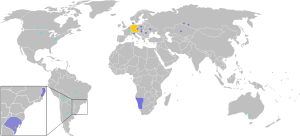German Language: West Germanic language spoken mainly in Central Europe
German (German: Deutsch) is a West Germanic language.
It is spoken in Germany, Austria, Switzerland, Liechtenstein and Luxembourg; natively by around 100 million people. It is the most widely spoken mother tongue in the first language. There are some people who speak German in Belgium, the Netherlands, France and Northern Italy. There are people who speak German in many countries, including the United States and Canada, where many people emigrated from Germany. It is also spoken in Eastern Europe, Bulgaria, Romania, and Russia.
| German | |
|---|---|
| Deutsch | |
| Pronunciation | [dɔʏtʃ] |
| Native to | Primarily German-speaking Europe, also in the worldwide German-speaking diaspora |
| Ethnicity | Germans |
Native speakers | 90 million (2010) to 95 million (2014) L2 speakers: 10–15 million (2014) |
Early forms | Old High German |
Standard forms | German Standard German |
| Latin (German alphabet) German Braille | |
| Signed German, LBG (Lautsprachbegleitende / Lautbegleitende Gebärden) | |
| Official status | |
Official language in | 6 countries 3 dependencies
Several international institutions |
Recognised minority language in | 13 countries (minority/cultural/national language)
|
| Regulated by | No official regulation (German orthography regulated by the Council for German Orthography). |
| Language codes | |
| ISO 639-1 | de |
| ISO 639-2 | ger (B) deu (T) |
| ISO 639-3 | Variously:deu – Germangmh – Middle High Germangoh – Old High Germangct – Colonia Tovar Germanbar – Bavariancim – Cimbriangeh – Hutterite Germanksh – Kölschnds – Low Germansli – Lower Silesianltz – Luxembourgishvmf – Mainfränkischmhn – Móchenopfl – Palatinate Germanpdc – Pennsylvania Germanpdt – Plautdietschswg – Swabian Germangsw – Swiss Germanuln – Unserdeutschsxu – Upper Saxonwae – Walser Germanwep – Westphalianhrx – Riograndenser Hunsrückischyec – Yenish |
| Glottolog | high1287 High Franconianuppe1397 Upper German |
| Linguasphere | |
 | |
German is a part of the West Germanic language family and is much like English and Dutch. Much of the vocabulary in German is related to English, but the grammar is more complicated.
German has a system of cases, and when helping verbs are used, the main part of the verb must be moved to the end of the sentence. For example, "Someone has stolen my car" is Jemand hat mein Auto gestohlen ("Someone has my car stolen"), and "Someone called me last night" is Jemand hat mich letzte Nacht angerufen ("Someone has me last night called").
In writing, every noun must start with a capital letter. German is the only language that still has that rule, but Danish and English did so a long time ago.
Standard German is an official language in Switzerland, but the Swiss dialect of German is difficult to understand for native speakers from Germany and even for Swiss who are not native to speaking German. One reason that the dialects are still so different today is that even if Switzerland adopted Standard German, mostly as a written standard, German Swiss in World War II wanted to separate themselves from the Nazis by choosing to speak dialect over the Standard German.
Swiss German also has some differences in spelling, for example, the letter ß, which is used only in German, is replaced by ss.

Dialects
- Alsatian
- Bavarian dialect
- Franconian Dialect
- Kölsch
- Low Saxon
- Swiss dialect
- Mannheimerisch dialect
- Palatinate German
- Russian (Siberian) dialect
German numbers
German numbers are similar to their English counterparts. Like most languages, the German number system is based mainly on the first 10 numbers. They will pop up over and over throughout all the higher numbers.
| English | German |
|---|---|
| 1 | Eins |
| 2 | Zwei |
| 3 | Drei |
| 4 | Vier |
| 5 | Fünf |
| 6 | Sechs |
| 7 | Sieben |
| 8 | Acht |
| 9 | Neun |
| 10 | Zehn |
References
Notes
Other websites

- Online German Language Course An online German language course that includes lessons covering pronunciation, vocabulary, and grammar.
- German phrasebook at Wikivoyage
- Learn to Speak German Archived 2013-06-08 at the Wayback Machine Student Resource
- Free German Language Course Archived 2013-02-17 at the Wayback Machine
- German Thesaurus
This article uses material from the Wikipedia Simple English article German language, which is released under the Creative Commons Attribution-ShareAlike 3.0 license ("CC BY-SA 3.0"); additional terms may apply (view authors). Content is available under CC BY-SA 4.0 unless otherwise noted. Images, videos and audio are available under their respective licenses.
®Wikipedia is a registered trademark of the Wiki Foundation, Inc. Wiki Simple English (DUHOCTRUNGQUOC.VN) is an independent company and has no affiliation with Wiki Foundation.
